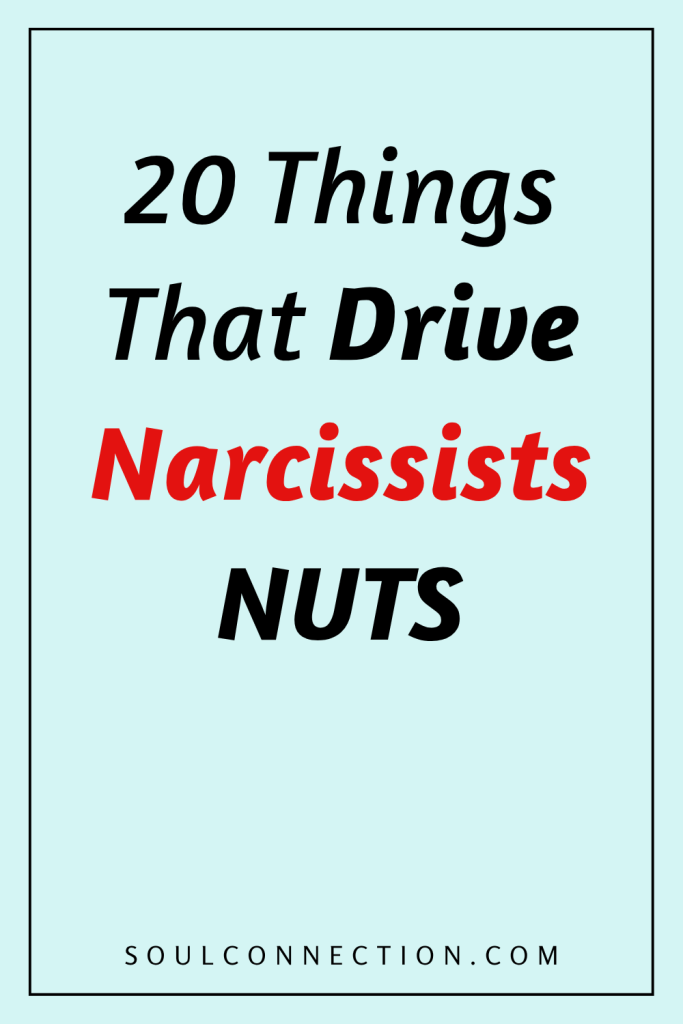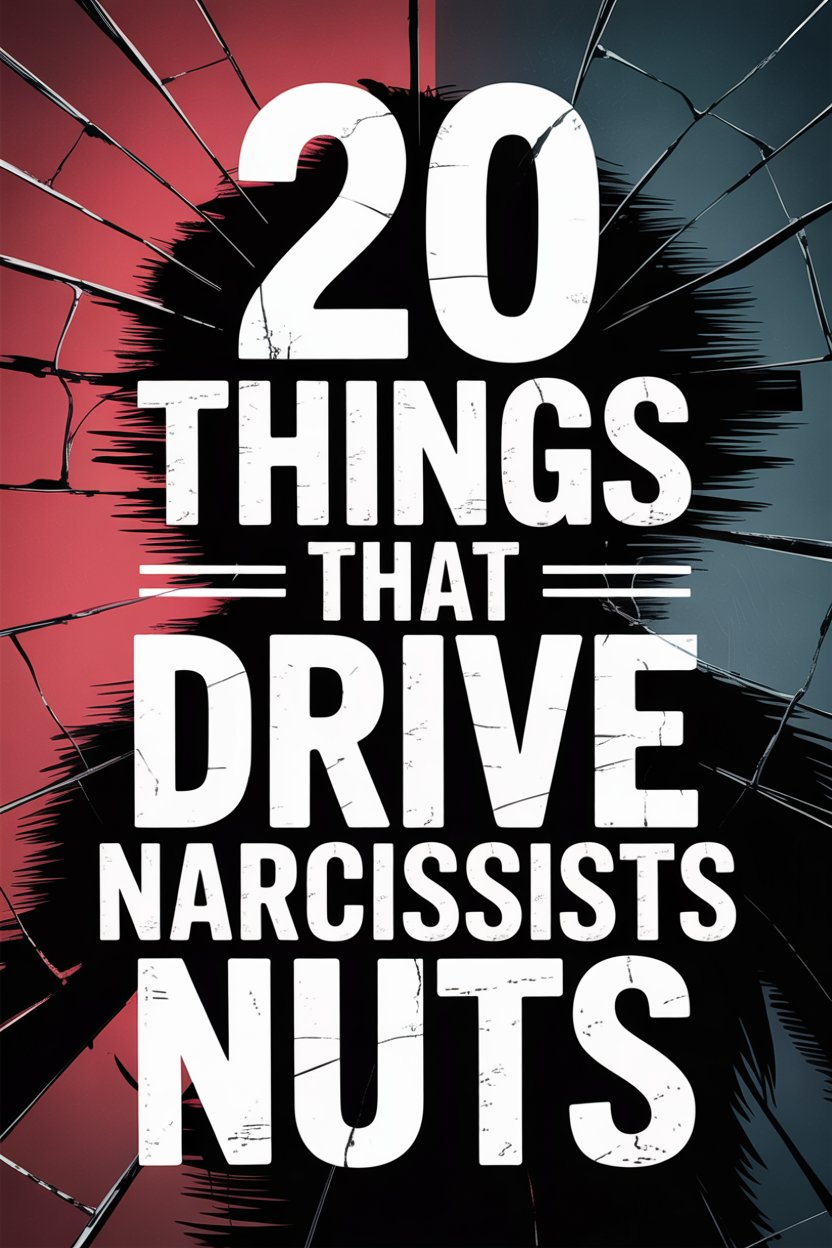Narcissists: their confidence is unbreakable, their charm is magnetic, and their egos are so fragile you’d swear they were made of spun sugar.
If you’ve ever tangled with one, you know how easily they can go from suave to sulking. Wondering what sets off their inner toddler tantrum?
Spoiler: It’s not just someone beating them at Mario Kart. Here’s a rundown of 20 things that absolutely send narcissists up the wall.
1. Criticism They Didn’t Ask For
There’s nothing quite like the look on a narcissist’s face when someone points out their mistakes. Feedback—even the gentle, sandwich-it-with-compliments kind—lands like a personal attack.
Their self-esteem is built on a house of cards, so even a breeze of “Maybe next time, try…” can send them scrambling for emotional shelter.
2. Being Ignored
Spotlight withdrawal symptoms set in fast. When the room’s attention drifts away from them, expect a sudden weather change: stormy with a chance of guilt trips.
Watch for dramatic exits, attention-seeking coughs, or a suspicious increase in “funny” stories about their glory days.
3. Someone Else Getting Praise
Did you just compliment someone else within earshot? Prepare for the narcissist’s version of an existential crisis. If it isn’t about their achievements, it might as well not exist.
They’ll either hijack the conversation or start listing their own accomplishments—louder.
4. Boundaries
Boundaries are like garlic to a vampire. Narcissists thrive on pushing past limits and taking up as much emotional space as possible. Tell them “no,” or remind them of your needs, and you’ll see just how creative pouting can get.
5. Not Being the Smartest in the Room
Narcissists are allergic to being outshined intellectually. Correcting them publicly, besting them at trivia, or—even worse—proving them wrong about something they “know” is a fast track to the silent treatment (or a monologue about why you’re technically still wrong).
6. Not Getting Special Treatment
If a narcissist isn’t the VIP, something must be broken.
Being asked to wait in line, follow the same rules as everyone else, or—heaven forbid—share the last slice of cake is an affront to their natural order. Queue the sulking.
7. Being Held Accountable
Responsibility is a hot potato, and narcissists drop it faster than you can say “consequences.” Hold them to their word or point out a broken promise, and suddenly you’re the villain.
Bonus points if they claim you’re “too sensitive” for caring.
8. Being Upstaged
If someone else is funnier, smarter, more attractive, or just gets more attention at a party, watch the narcissist’s mood nosedive.
Expect a rapid-fire series of attempts to reclaim center stage—loud opinions, wild stories, or even manufactured drama.
9. Empathy from Others
Narcissists want all the warm fuzzies directed at them. When people rally around someone else’s struggles or pain, it’s baffling.
Cue the “But what about me?” moment, or attempts to redirect sympathy their way.
10. Not Getting Their Way
Compromise? That’s a word for other people. Narcissists expect the world to bend around their preferences, so anything that blocks their path (your needs, other people’s ideas, basic laws of physics) is intolerable.
11. Genuine Intimacy
Surface-level affection? Perfect. Real vulnerability? Hard pass. Deep, messy, reciprocal emotional connections threaten their carefully curated persona.
They’re more comfortable with admiration than actual connection—because connection comes with accountability.
12. People Who Can’t Be Manipulated
It’s infuriating when someone doesn’t buy what they’re selling. If you see through their tactics, refuse to engage in games, or call them out, the narcissist quickly moves from charming to combative.
They’d rather find new targets than admit defeat.
13. Being Exposed
The greatest fear isn’t being disliked—it’s being unmasked. Anything that reveals flaws, insecurities, or the gap between their words and actions is a direct threat.
They might switch to damage control or simply deny everything with the conviction of a cartoon villain.
14. Sharing Credit
Group achievements are only fun when the credit flows one way. Narcissists can’t stand having to share the spotlight or admit that anyone else contributed. “We” is a four-letter word in their dictionary.
15. Being Out of Control
Control is their lifeblood. When plans change, people don’t react as expected, or someone else calls the shots, panic sets in.
Expect a frantic bid to regain control—often disguised as “helpful advice” or “concern for everyone’s happiness.”
16. Authenticity
Genuine people are confusing. When someone is confidently themselves—warts and all—it’s both threatening and incomprehensible.
Narcissists rely on masks, so seeing someone thrive without one is a reminder that their own isn’t fooling everyone.
17. Losing Popularity
Social status is everything. Losing friends, falling out of favor, or simply not being the most-liked person in the room triggers an existential drama.
Expect frantic rebranding efforts or a smear campaign against whoever’s currently topping the charts.
18. Being Called Out in Public
Private feedback is bad enough, but being challenged in front of others? That’s nuclear-level humiliation. Watch for bluster, denial, or attempts to turn the tables—anything to avoid facing the crowd’s gaze.
19. Other People’s Boundaries
Other people’s needs, time, and emotional reserves are seen as public property. When someone firmly defends their limits, the narcissist interprets it as a personal attack.
Cue the accusations of you being “difficult,” “selfish,” or “ungrateful.”
20. Indifference
Nothing stings quite like apathy. The narcissist’s entire existence is built around eliciting strong reactions—positive or negative.
When their antics, moods, or manipulations meet a shrug and a yawn, it’s almost like the world is broken. Or at least, fundamentally unfair to them.
What to Do When the Narcissist Starts Melting Down
Recognizing the triggers is one thing—handling the fallout is another. If you’re dealing with a narcissist’s meltdown, remind yourself: their reaction is about their insecurity, not your inadequacy.
Stand your ground, hold your boundaries, and don’t get sucked into the emotional cyclone.
If you’re in a relationship with a narcissist, consider what you’re willing to tolerate—and what you need to protect your own well-being.
The more you lean into authenticity, healthy boundaries, and honest relationships, the less power their tantrums have.
And if you ever find yourself tempted to “fix” their reactions or soothe their ego, repeat after me: “Not my circus, not my monkeys.”
Save your energy for people who can handle a little criticism without needing an emergency ego repair kit.


